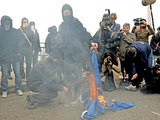
2009-04-24
BERLIN/BADEN-BADEN (GFP report) - The reporting on the NATO summit at the beginning of April was controlled centrally, and coordinated by arrangement with the agencies of repression of the state, as evidenced by statements by staff of the Südwestfunk (SWR) [the state broadcasting corporation in Baden-Württemberg]. According to this, the declared objective was to make the "official images" the "dominant images". The journalists accredited with NATO were prepared for their job by a trained war reporter, in close collaboration with the Baden-Württemberg police. The man in charge runs a private "security" company which trains the managers of German firms for secondment to war zones, and, he himself says, includes members of "police and military special units" among his trainers. He recently proposed that a "Special Forces Command" of government-paid press spokesmen be deployed in "cases of crises", such as terrorist attacks, which the authorities did not preclude on the occasion of the NATO summit.

Dominant Images
The public broadcaster Südwestrundfunk (SWR), which had already been responsible for broadcasting propaganda programs on military policy several times (as reported at german-foreign-policy.com [1]), acted as the "host broadcaster" of the German Federal government at the NATO summit in Baden-Baden and Strasbourg. SWR prepared the "Weltbild", the central film material supplied to television stations around the world. According to the station, a total of 400 people were involved in the reporting on the NATO events: motorcycle squads and "satellite news-gathering teams" specially assembled for this purpose were employed.[2] The coordinator in the SWR's "NATO Summit Planning Group", Georg Weisenberger, explained that the goal of the reporting was to ensure that the demonstrations against the Summit did not dominate public perception, but rather that "the official images [become] the dominant images".[3]
"Rustic"
According to Weisenberger, the "cooperation" with the Baden-Württemberg police in this respect was "excellent".[4] The law-enforcement authorities not only acted as "contacts" for journalists, but were also directly involved in the preparation of the media representatives for the NATO summit. More than a hundred journalists trained how to behave in case Molotov cocktails were thrown at them, among other things, on the grounds of the riot police in Bruchsal [near Karlsruhe].[5] The head of the operations division of the Bruchsal riot police, Klaus Pietsch, introduced the participants in the training session to police tactics and corresponding concepts, and prepared them for "rustic" intervention measures by the state forces of repression against "troublemakers" and blockades.[6]
War Reporter
Weisenberger's colleague in the SWR planning group, Stephan Schlentrich, was in charge of the training sessions for journalists. This reporter for ARD [the German national public TV network = First Program] is considered a specialist in the subjects of "internal security" and "terrorism"; in the past, he has been a lecturer at the Police College in Villingen-Schwenningen (Baden-Württemberg). Schlentrich trained as a war reporter in England, and has been part of the group of journalists responsible for "crisis operations" in the ARD since 2003; in this function he has reported from the Iraq war zones several times, for example.[7]
Official Information
Schlentrich also has close contacts to the German military. For example, he spoke on the subject of "Terrorism as a Communication Strategy" in the spring of 2008 for the Bundesakademie für Sicherheitspolitik (BAKS) ["Federal Academy for Security Policy"]. At that time, a comprehensive "supply of official information" was demanded, in order to counter "speculations", or worse still, "false reports" spread by journalists in the case of a terrorist attack on Germany. For this purpose, Schlentrich recommended setting up a "special forces command" ("press spokesmen SFC") consisting of PR experts, that should be "on the spot rapidly in a crisis", "in order to coordinate the press work".[8] The name is a reference to the Bundeswehr's Special Forces Command, which is in charge of undercover operations behind enemy lines and anti-guerrilla warfare in the theaters of operation of the German armed forces.
"Hostile Environment Training"
Besides his work for ARD and the state forces of repression, Schlentrich runs the private Steinbeis-Transferzentrum Communication, Safety and Security" (CSS). The firm belongs to the Steinbeis group, which registered a turnover of 124 million euros in 2008 with its total of 765 firms.[9] In addition to training government representatives for "operational tactical management" of civilian and military bodies in case of "major damage situations", such as attacks with atomic, biological or chemical weapons, CSS also offers a "Hostile Environment Training".[10] This is intended in particular for managers, technicians, journalists, and employees of NGOs, who are supposed to "be prepared professionally for deployment abroad and in worldwide hazard areas". The program includes "introductions to foreign cultures", "behavior at military checkpoints", "danger recognition", and "psychological preparation for extreme situations such as kidnappings". According to CSS, the "permanent core of trainers" includes both cultural specialists, physicians, and psychologists, and "experienced security experts" and "trainers of police and military special units".[11]
[1] see "Willkommen im Krieg"
[2] "SWR-Organisatoren: 'Mit der Polizei läuft die Zusammenarbeit ausgezeichnet, mit der NATO gestaltet sie sich schwierig' - Satellitengestützte Fahrzeuge und Reporter-Motorräder im Einsatz"; www.goodnews4baden-baden.de 16 March 2009
[3] [4] Interview with Georg Weisenberger; www.goodnews4baden-baden.de 16 March 2009
[5] "Ausbildung von 100 Medienvertretern für den NATO-Gipfel: 'Man muss nicht um jeden Preis das Bild des Tages schießen'"; www.goodnews4baden-baden.de 22 March 2009
[6] "Schiefes Weltbild: Wie die Fernsehbilder des NATO-Gipfels 2009 von den Behörden beeinflusst werden"; www.gipfelsoli.org
[7] Portrait of Stephan Schlentrich; www.it-defense.de
[8] Seminar für Sicherheitspolitik 2008: Modul 5 - Krisen und Krisenmanagement in medialer Vermittlung; www.baks.bundeswehr.de
[9] "Daten und Fakten"; www.stw.de
[10] Steinbeis-Transferzentrum Communication, Safety and Security; www.stw.de
[11] "Kopf in den Sand ist keine Lösung! Kaum ein Unternehmen bereitet sich
ausreichend auf Krisensituationen vor"; www.stw.de